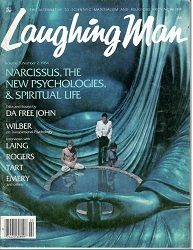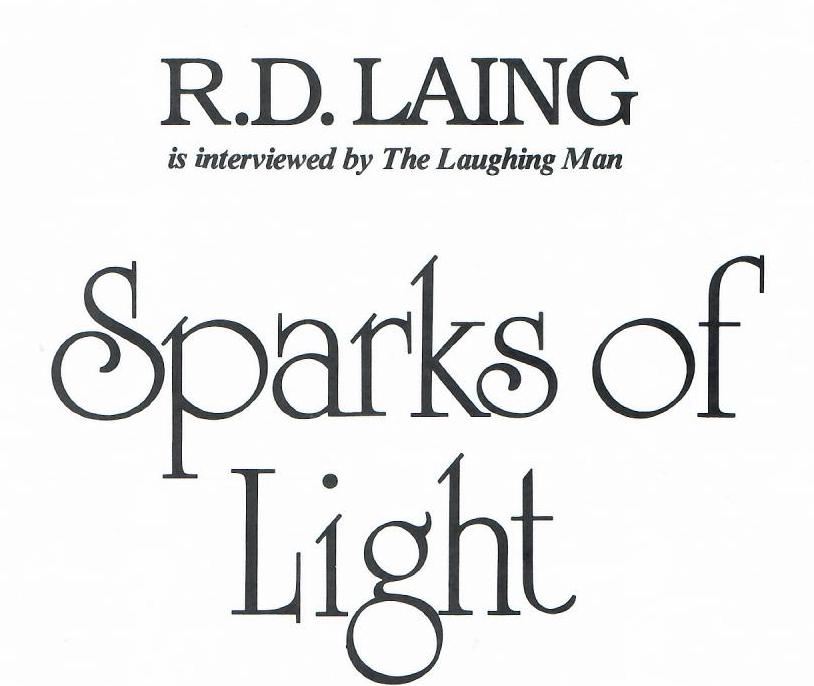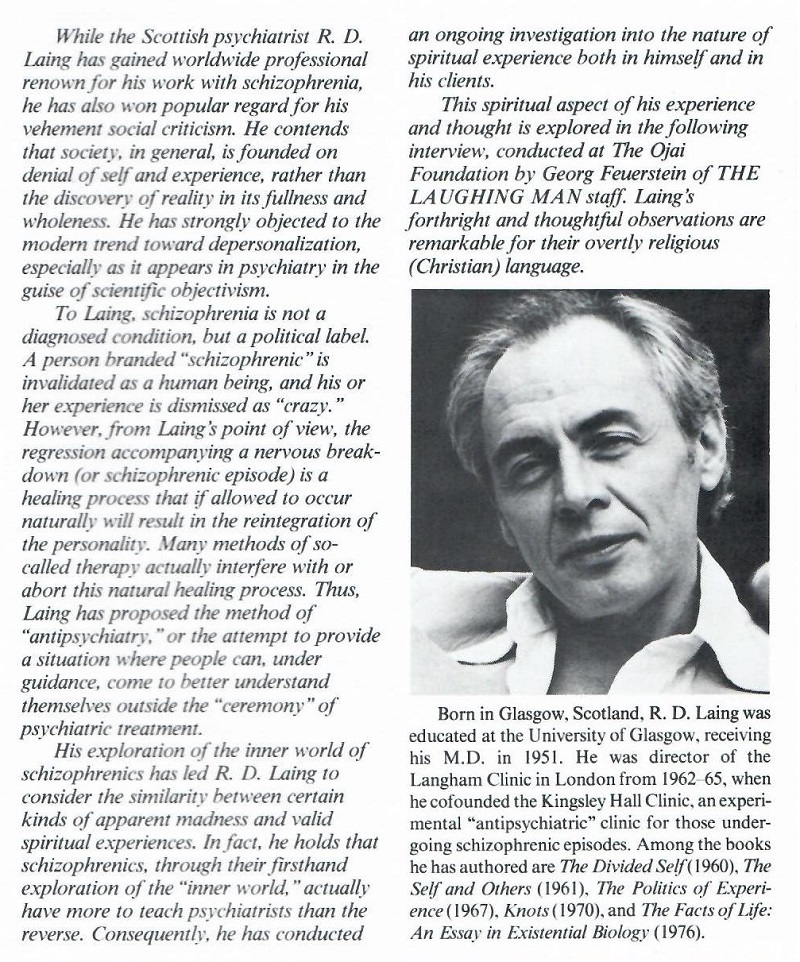
1984


“It has always been recommended to spend time with spiritually awake people.”
R.D. Laing
TLM: You have inspected your life perhaps more intensively and systematically than most people. What has been your most valuable discovery from this process of inspection?
LAING: That hope is justifiable. In Christian language, the highest values are faith, hope, and charity or love, and the most important of these is love. However, love can become darkened or disappear, and we may not always be aware of love in our hearts or believe that it exists in the world. How strange it seems that there should be love at all in this world. That love exists at all seems more a bonus than an essential feature of the universe.
But human life is only dust and ashes without love. If you investigate and inquire into the world without love, you don’t find anything worthwhile. If you look at a tree or a frog or anything at all without the eyes of love, then you obtain only loveless, heartless knowledge. When such knowledge is accumulated and applied to practices of scientific technology, it becomes the most destructive form of knowledge ever discovered. Even the worst black magic cannot vie with the destructive capacity of science. Its very method is to destroy what it looks at in order to discover its elements.
When we start to doubt, hope is the anchor that binds our faith to love. I am speaking in the vocabulary of Christianity. It is a pity that this vocabulary is so degraded. The first English translation of what is now called “the holy ghost” was by John Wycliffe, who translated it as “our healthy spirit.” That is the manifestation of Divinity within and through our own nature. All our natures, with this healthy spirit, are sparks of light in the same fire. That immediately unites us. That companionability in the light of our healthy spirit— which is light and love and the way and truth and life—is what I have become less embarrassed about affirming in the course of the last thirty years or so.
TLM: Would you say that psychiatry is suffering in its models, approaches, and overall ethos from the ill effects of a materialist ideology?
LAING: Yes, very fundamentally. It even includes a schizoid spiritual materialism. Many psychiatrists think they fervently believe in God, yet hold the theory that thoughts are epiphenomena of the brain. Of course, how we articulate the nature of the brain’s relationship to our spirit is a very deep problem of language and insight. But by and large, we have a materialistic psychiatry and a materialistic humanism rather than cosmic consciousness. In the end, psychiatrists cannot even be humane unless they see Man’s place in the whole scheme of things.
TLM: Apart from writing books or giving lectures that challenge the scientistic ideology that obviously rules our civilization, what do you propose as reasonable countermeasures for yourself and other people like yourself?
LAING: Prayer is very important. I think the most important prayer is a prayerful waiting or attentiveness that doesn’t specifically ask for anything. Mother Teresa recommends what I imagine is the most useful prayer. It consists of simply listening to the silence of one’s own heart. I don’t think one can do any better than that.
One can serve the world and humanity by stopping what one realizes one should not be doing, even if one can’t think of anything else to do. Many people say, “If we stop this, what will we do?” We simply don’t know what we will do. If we are lost in a dark wood, we never discover where we are until we realize we are lost. What do we do, when we don’t know what to do?
TLM: Do you feel that prayer is effective because you transform yourself by praying, or do you have a sense that prayer can actually affect the world?
LAING: Yes, I believe that the material world is contained within the world of the Spirit, which has final, triumphal mastery of the situation at all times. I don’t think anything happens to materials except what Spirit allows.
TLM: What, then, do you feel is the highest potential of Man?
LAING: The highest human potential is to glorify the Spirit, for the Spirit to manifest itself through us. 1 think that comes by the grace of the Spirit. The very cooperation of Man with God is God-given. The end of life is to glorify God and enjoy Him forever. The token of that perfect accomplishment is beatitude.
I don’t like to go so far as to talk of actual union with God or becoming God. Such expressions tend to encourage Man’s vanity and spiritual ambitions. You find people saying, “What’s the point of being a bank manager if, through meditation techniques, you can become God in less time than it takes to get through business school?” I would much rather speak of being a slave of God, in whose service is perfect freedom.
TLM: You wrote in The Politics of Experience that in order to adapt to the world the child abdicates its ecstasy. Master Da Free John argues that ecstasy is our native condition, out of which we project our sense of human dilemma.
LAING: Yes, I think ecstasy is the native condition of ordinary mind. Our conditional mind has covered it over. What we take to be our ordinary mind is an aberration. The whole world is magical. Every child is aware of that until persuaded otherwise.
The very
cooperation of
Man with God
is God-given.
The
end of life
is to
glorify God
and enjoy Him
forever.
The token of
that perfect
accomplishment
is beatitude.
TLM: Would you say this loss of ecstasy is inevitable?
LAING: No, I don’t at all think it’s inevitable. I think it’s an aberration of our civilization.
TLM: Do you feel that there have been civilizations before ours where people actu ally maintained this state of ecstasy from childhood through adulthood?
LAING: Without any doubt, our civilization is unusual in its manner of culturing out everything transpersonal, along with all the fairies and spirits and so forth. But you have to go back to Aeschylus and the Greek tragedians, where you find a sense of the time before history was written down. You have to go back to Homer, and Homer just gives us the transition from all that went before. In The Origins of Consciousness in the Breakdown of the Bicameral Mind Julian Jaynes points out that in the Old Testament and in Homer practically all the major figures heard voices and saw visions as well as dreamed.
TLM: Experience figures very large in your work and presumably in your life. But experience presupposes an experiencing subject, or the ego. Therefore, no experience can be truly transcendental, since the ego is still in place. What is your view on that?
LAING: I don’t think that such a thing as the ego exists. The ego is a cultural hallucination. The “ego” is a name for a coherent set of mental operations that enable us to function in our society. We draw a circle around those operations and think it is a thing with which to identify ourselves. We must disidentify ourselves from the ego and see it as a process, a systematic, reasonably coherent set of operations. What we call our ego we know to be always changing, impermanent, transient, but still we persist in this hallucination.
The transcendental perspective is both immanent and transcendental. So one must simultaneously get into oneself and out of one’s ego. It is a return to ordinariness, as in the ox-herding cycle of Japanese Zen Buddhism. A mountain finally becomes a mountain again, a tree a tree, a river a river.
TLM: In that “experience” of enlightenment, is the ego still in place somewhere? Are people functioning on the egoic level?
LAING: Yes, it is a residue.
TLM: Consider an alternative to your definition of the ego. Master Da Free John defines the ego as the mechanism of identification with the body-mind, rather than as something essential to functioning. That opens the possibility that this mechanism comes to an end. One can still function in the world, but be identified with the All Identity of everything. Do you concede that possibility?
LAING: Absolutely. What I am saying is not an objection to what you are saying, but simply a discussion of how we use words. I am inclined to reserve the word “ego” for a product of that process of identification. You would use the word ego for the process of identification itself.
In the etymological sense, Nirvana is sometimes delineated as “nir” being “no” and “vana” being “spinning.’’Thus, Nirvana is the end of the spinning and weaving of this product by turning mental and physical processes into a sort of web with which one identifies oneself. Another way of expressing that transcendental-immanent experience of oneself is the metaphor of the circle whose perimeter is infinite and whose center is nowhere.
Some people might first discover this by sitting cross-legged for a long, long time until this identification with the body and with what we call our mind evaporates. Then everything is as it was before, but without that identification.
TLM: Here is a quote from Master Da Free John’s Work: “Heartfelt release of fear is the secret of passing through the spiritual process without going mad.”1 What is your feeling about that? Fear is a major theme in psychiatry, as well as being a major theme in all kinds of spiritual testing.
“Fearlessness is the final release from anything that can be thrown at one.”
LAING: Temptation has not so much to do with being drawn into all sorts of bad thoughts as it does with being intimidated by the worst sort of terrors and demons that can be presented to oneself. In the Buddha’s last meditation before he achieved enlightenment, he was beset by demons and his only response was to touch the Earth. That fearlessness is the final release from anything that can be thrown at one. It goes beyond the need to be courageous.
I still get frightened myself. I cannot claim that I am not afraid of anything, but I am in the next best position: I am not afraid of being afraid.
TLM: That quote continues, “You will find no peace until you have realized love, sacrifice, and self-surrender. You must surrender to God literally and release your fear. Such surrender is the foundation of religious life and spiritual practice.” 2
LAING: Absolutely.
TLM: “Surrender is the mechanism of transformation, heartfelt surrender to God, and the great Mechanism in Nature that quickens the surrender of human beings is a human individual who can act as Spiritual Master, an individual who is transparent to the Life of God and who can enter into relations with devotees.”3 What is your feeling here?
LAING: If one is surrendered completely to God, then one has no fear of death, no fear of what anyone can throw at one, and
-
Da Free John, Compulsory Dancing (The Dawn Horse Press, 1980), p. 91.
-
Ibid., p. 92.
-
Ibid., p. 28. that is tantamount to peace. Again, in the English translation of the Greek New Testament we find, “Blessed are the poor in spirit.” In the original it reads “Blessed are the spiritual beggars,” those who are com pletely empty-handed. That emptiness is synonymous with surrender. In surrender, you lose everything. If one is surrendered to God, one cannot find any consolation or satisfaction in anything else but God. That brings complete peace, complete emptiness, and total service. All these words—peace, love, blessedness, fearlessness—are simply different facets of the same diamond.
“Blessed are the poor
in spirit.”
In the original, it reads,
“Blessed are the
spiritual beggars, ”
those who are
completely empty-
handed.
TLM: One last quote: “The first obstacle, and the primary obstacle, to spiritual life is the relationship to the Spiritual Master. It is also the fundamental condition, content, and source of spiritual or real life.”4 What is your response to that?
LAING: This is a paradox. Spiritual teachers are a God-given grace in this world. All spiritual teachers tell their students, “Don’t cling to me.” When a woman put her hand out to touch Jesus’ robes, his response is often translated “Don’t touch me,” but the original meaning is “Don’t cling to me.” There is also the metaphor of the good shepherd. But the whole point of the shepherd is to help the sheep to realize that they are not sheep. Attachment to a teacher is one of the more subtle obstacles in spiritual life.5
-
Bubba [Da] Free John, The Method of the Siddhas, rev. ed. (The Dawn Horse Press, 1978), p. 200.
-
The spiritual relationship between Adept and disciple is a paradoxical one. To relate to the Adept as a parent figure, cultic idol, or God-substitute only undermines the spiritual process, depriving the disciple of responsibility. Rather, the Adept must be recognized as the transparent Agency of the Being-Consciousness that is the true Identity of all beings and things, including the disciple. In that case, the disciple’s surrender to the Adept provides the spiritual connection to the Living Force of Consciousness that directly instructs the disciple and quickens his Awakening. standing of what surrender to the Spiritual Master means. Therefore, there is an immediate reaction to the idea of Spiritual Masters. The ego by nature does not want to surrender to anything, least of all another seemingly human being, God-Realized or not.
“The ego by nature does not want to surrender to anything, least of all another seemingly human being, God-Realized or not.”
TLM: In another sense, the guru could also be an obstacle insofar as there is a misunderstanding of what surrender to the Spiritual Master means. Therefore, there is an immediate reaction to the idea of Spiritual Masters. The ego by nature does not want to surrender to anything, least of all another seemingly human being, God-Realized or not.
LAING: I wouldn’t regard anyone as a true spiritual master who nonparadoxically demands of disciples that they surrender to him. One can get a touch of something one had not glimpsed from the presence of another person who is further advanced in the spiritual path than oneself. It has always been recommended to spend time with spiritually awake people.
TLM: What do you feel is the reason for that?
LAING: Once again, to put this in Christian terms, Jesus says, “When two or three are gathered together in my name,” not in the name of Jesus but in the name of Christ, “then there I am.” There seems to be a sort of spiritual force field, like a magnetic field, that is set up.
TLM: Would you say, then, that a Spiritual Master can serve a genuine function for people who have a spiritual appreciation?
LAING: Oh, yes.
TLM: Did you ever have any association of this kind?
LAING: I have associated with a number of holy men. It is impossible for me to imagine what my life would have been like without meeting and spending quite a lot of time in the company of such people. But I have never felt any inner impulsion to surrender myself to a guru. However, if some people feel they need to do that, then I think it is perfectly appropriate for them to do so. A genuine spiritual master would not be able to exploit that for his own egoic advantage. It has been said that if you go to a guru with a pure heart, that purity of heart will protect you, even if the guru turns out to be an impostor. It will do the guru harm, not the disciple.
TLM: Do you feel there are people around now who actually have Realized God and are empowered to lead other people to the same Realization?
LAING: I have not personally met any such one. I have met a number of people I would regard as servants of God.
TLM: You are saying you have not actually met somebody whom you felt was God- Realized. Is that, perhaps, the reason you did not have that impulsion to surrender to a guru? If you had met Jesus, would you have followed him? As he said, “Follow me.”
LAING: (pause) 1 hope so. Yes, definitely.
TLM: That is an honest answer. ■